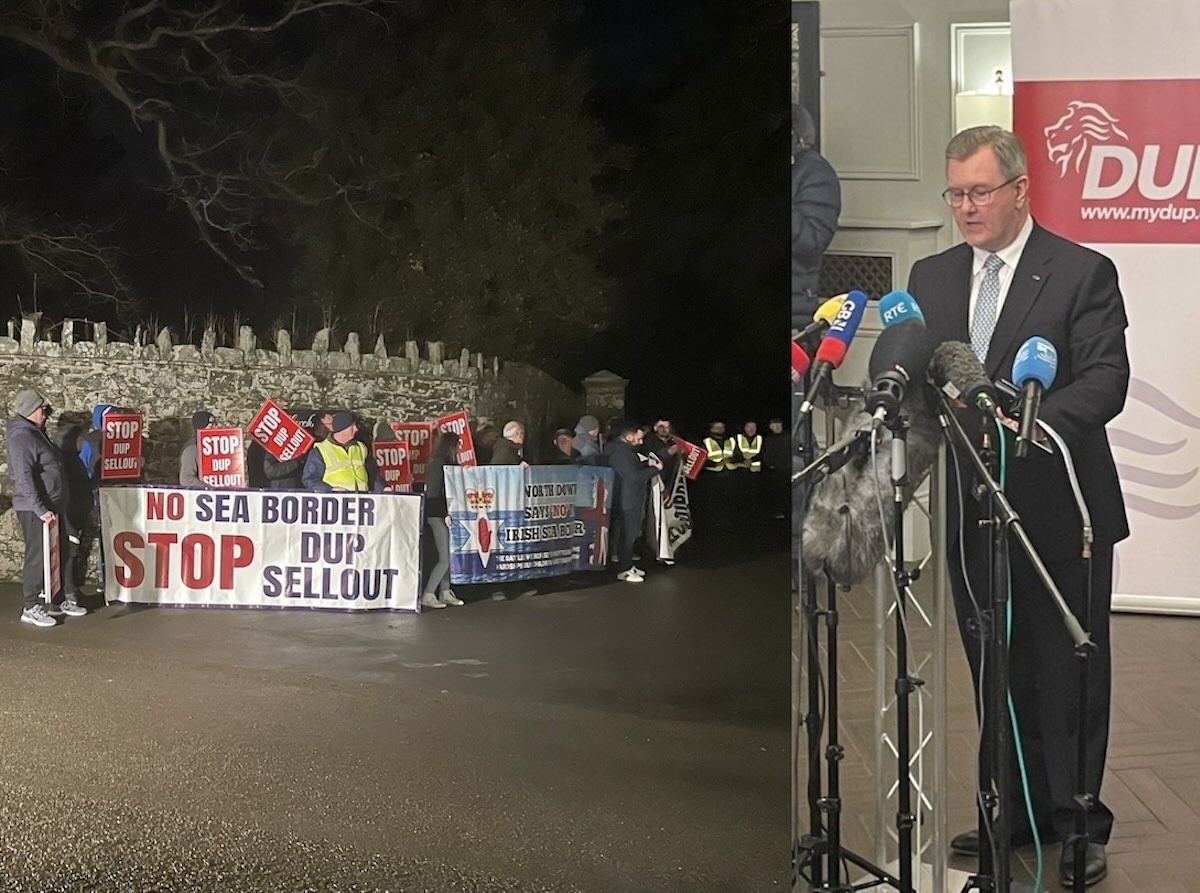
After a two-year boycott, the DUP’s executive has voted to endorse a deal to return to power-sharing at Stormont.
The leader of the North’s largest unionist party, Jeffrey Donaldson confirmed the news at a press conference in the early hours of this morning. He said that the Six County power-sharing institutions would be back up and running before 8 February.
It followed a bizarre night during which loyalist Jamie Bryson live-blogged part of the meeting of the DUP executive as part of a protest by hardliners.
But after incremental progress in recent weeks and several false starts, there was ultimately a clear majority vote in the 130-strong DUP executive in favour of returning to Stormont.
It came during a ‘secret’ meeting which extended for more than five hours on Monday night at Larchfield Estate, a corporate venue near Lisburn. Dozens of protestors waved flags and held posters outside the estate denouncing a “DUP sellout”. Those protesting cheered or booed each vehicle, depending on which DUP member was inside the car.
Donaldson told the press conference at 1am this Tuesday morning that the deal is subject to new legislation being passed by the British government and final agreement on a timetable.
“We will only be able to move after the government faithfully delivers on the implementation of its legal and other commitments,” he said.
“Both our party officers and party executive have mandated me to move forward.. on the basis of the proposals brought forward by the government subject to and on the basis of the government delivering measures of that package.”
Donaldson had been struggling to convince the notoriously intransigent hardliners within his own officer board, at least one of whom is believed to have attempted to sabotage the deal through flagrant leaks.
On the question of the vote by the executive, the DUP leader said tonight it had been “decisive” and that he had a mandate to press ahead with the deal. The specific details were not published but Donaldson said he was “confident” in the progress he had achieved.
He said he believed the British government could move “quickly” to bring forward legislation. Any new legislation could have a significant impact for the Windsor Framework, which implements protections for the EU single market. It itself emerged from the ‘Northern Ireland Protocol’ of the Brexit Withdrawal Agreement, which was denounced for years by loyalists for creating an ‘Irish Sea Border’ for trade between Britain and Ireland.
Donaldson said his deal would “end Northern Ireland blindly following EU laws”. He also said it would remove checks on goods moving from Britain with a final destination in the north of Ireland. He further claimed there would be legislation to bolster acts of the Westminster parliament dating from 1800 by which Ireland was first annexed by Britain. Hardline unionists had claimed that Article 6 of the acts, which deals with trade between Ireland and Britain, had been “dismantled” by Brexit.
He said: “There will be legislation protecting the Acts of Union, which guarantees unfettered access for Northern Ireland business to the rest of the UK.” Regardless of who forms the next government in London, these measures would be taken as “legislative commitments”.
Jim Allister, leader of the extreme loyalist TUV, denounced the deal.
“Sadly, in betrayal of their own solemn pledges, the DUP has caved in on an Irish Sea border, EU law and the suspension of Article 6. Seems not one word of the Union-dismantling Protocol has been removed, he said.
Hardliners within the DUP, such as Ian Paisley Jr and Sammy Wilson, have not yet revealed their position. But Sinn Féin leader Mary Lou McDonald said she was “optimistic”.
“Sinn Féin will now engage with the parties and both governments to ensure we now all press on without delay,” she said.
“It is vital there is political stability to address the scale of the crisis across our public services.
“Let’s now focus minds on the job at hand and to the solutions required to support workers and families who want and deserve functioning government.”
![[Irish Republican News]](https://republican-news.org/graphics/title_gifs/rn.gif)
![[Irish Republican News]](https://republican-news.org/graphics/title_gifs/harp.gif)

